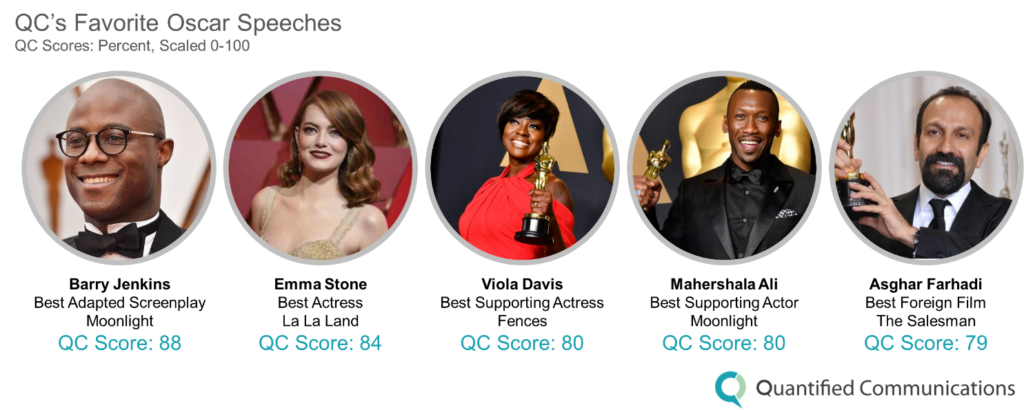QC’s Favorite Oscar Speeches

Some 30 million people tuned in Sunday night as the stars made their way down the red carpet for the 2017 Academy Awards. For film gurus, the main attractions are awards themselves. For the more casual viewers, maybe it’s the clothes or the musical performances.
For the QC team, the most exciting part of Oscar night is the speeches. So we tuned in to find out how these incredible actors, writers, and filmmakers would perform on a different kind of stage.
Before We Dive In: What is a QC Score?
The QC Score by each actor’s name represents their overall effectiveness in their speeches Sunday night. To identify these scores, we use a combination of natural language processing, automated vocal analytics, and insights from a panel of 15 communication experts to measure the content of a speech, a speaker’s delivery skills, and how an audience is likely to perceive the speaker based on that particular event.
You can read more about how these scores work in our white paper. But, for now, on to the speeches:
Barry Jenkins: QC Score, 88
After a series of charged awards shows, last night’s Oscars were relatively silent on political issues, but Barry Jenkins’ brief, powerful speech took the internet by storm for its poignant message of inclusivity:
“All you people who feel like there’s no mirror for you, the academy has your back, the ACLU has your back, we have your back, and for the next four years, we will not forget you.”
Jenkins’ speech was CEO Noah Zandan’s favorite, and he noted the great rhythm of the director’s remarks. Our data supported that observation: Jenkins scored in the top 7 percent for rate effectiveness (a measure of how effectively a speaker controls rhythm through tempo), which contributed to his ability to engage his audience more effectively than 98.7 percent of speakers in our database.
Emma Stone: QC Score, 84
Stone’s graceful speech demonstrated a humility that endeared her to audiences:
“I still have a lot of growing and learning and work to do. And this guy is a really beautiful symbol to continue on that journey and I’m so grateful for that. So thank you so much. Thank you.”
QC communication expert Kory Kelly noted that this show of vulnerability was the key moment in Stone’s speech. While too much of it can diminish a speaker’s credibility, Stone used just the right touch on the Oscar stage. According to QC data, audiences were likely to perceive her in the top 2 percent for authenticity.
Viola Davis: QC Score, 80
Davis tugged on heartstrings with her vivid explanation of why she became an artist:
“People ask me all the time, what kind of stories do you want to tell, Viola? And I say, exhume those bodies. Exhume those stories. The stories of the people who dreamed big and never saw those dreams to fruition. People who fell in love and lost. I became an artist — and thank God I did — because we are the only profession that celebrates what it means to live a life.”
Davis’ highly visceral language enabled viewers visualize the story she told, internalizing her message for ourselves. This helped her deliver a message QC data found to be more captivating than 98 percent of the speeches in our database.
Mahershala Ali: QC Score, 80
The Moonlight actor demonstrated his knack for sharing his emotions with the audience during his SAG award speech in January, and that talent was on full display again at the Oscars, where Ali used his tone to demonstrate emotion more effectively than 98 percent of the speakers in the QC database.
According to QC communication expert Briar Goldberg, when the audience can hear and understand how a speaker feels, they are more likely to feel those same emotions, themselves. Ali’s ability to wear his emotions on his sleeve — and in his voice — helped him engage with his audience in a truly meaningful way.
Asghar Farhadi: QC Score, 79
The Iranian director of The Salesman boycotted the 2017 Oscars in protest of Trump’s travel ban, but sent a statement, which Anousheh Ansari (the first Iranian to go to space) read for him.
“I’m sorry I’m not with you tonight. My absence is out of respect for the people of my country and those of other six nations whom have been disrespected by the inhumane law that bans entry of immigrants to the US.”
Farhadi’s written statement makes a strong statement against the president’s actions and, with a storytelling score of 97.9, paints a clear picture of filmmakers’ responsibilities in times like these:
“Filmmakers can turn their cameras to capture shared human qualities and break stereotypes of various nationalities and religions. They create empathy between us and others. An empathy which we need today more than ever.”
(It’s important to note that, because Farhadi did not deliver his statement, his QC score contains only the content evaluation. Our perception of Farhadi is based on his words, not on Ansari’s delivery of them.)
When we put ourselves in these celebrities’ shoes, we can see how it could be difficult to give a strong acceptance speech. But these five film icons show us how to put aside surprise and nerves to offer a gracious address with a poignant message for our audiences.
What were your favorite Oscar speeches?